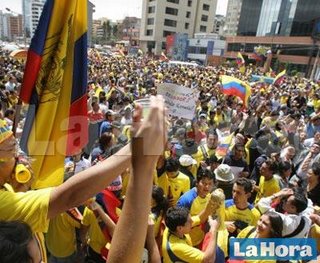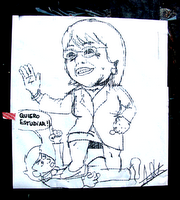 An agreement has been made so far in Chile, making reality a historic event of the people having a say in what to do about the basic right of free and adequate education. Bachelet has commented that the Chilean education system is expensive and inadequate. One can also say that government officials in the U.S. would empathize with Bachelet’s view, since the common tactic to deal with the “expense” of education in the United States is to make further cuts, close and consolidate schools and blame underpaid teachers. Asking this question is relative to what a person or government considers expensive or a burden. Paris Hilton might find buying a $300 pair of shoes by Coach a treat, but the thought of working a 40-hour week a nightmare. So I question, how does it reflect on a president like Michelle Bachelet when she says the education system is expensive or “expensive”. How does it reflect on a government like the U.S. that is cutting education but spends billions in arms and wars? It all depends on what a person or government considers an investment or “investment”.
An agreement has been made so far in Chile, making reality a historic event of the people having a say in what to do about the basic right of free and adequate education. Bachelet has commented that the Chilean education system is expensive and inadequate. One can also say that government officials in the U.S. would empathize with Bachelet’s view, since the common tactic to deal with the “expense” of education in the United States is to make further cuts, close and consolidate schools and blame underpaid teachers. Asking this question is relative to what a person or government considers expensive or a burden. Paris Hilton might find buying a $300 pair of shoes by Coach a treat, but the thought of working a 40-hour week a nightmare. So I question, how does it reflect on a president like Michelle Bachelet when she says the education system is expensive or “expensive”. How does it reflect on a government like the U.S. that is cutting education but spends billions in arms and wars? It all depends on what a person or government considers an investment or “investment”.
The Bolivian government, with the help of Cuba and Venezuela, has taken the position that teaching native indigenous Bolivians to read and write an investment. The classes are free and there is no profit being made. The teachers are volunteers and the materials donated from Cuba and Venezuela. Already 1,003 have past the first faze, with many more in learning and the plan of teaching 1.2 million. Some may believe it is an investment in educating youth to become professionals in a country that lacks and hindered by underdevelopment. Actually a large number of students are over 30, some even in there 70s and 80s. But the investment in this case is human, in other words, the development of a cultured people is the reward. The campaign is titled "Yes, I Can" ("Yo, Si Puedo") and using as a slogan Jose Marti’s word, “To be cultured, is the only way to be free.” But furthering the education of the youth into professional fields and have them stay in their native country will help them advance economically.
teaching native indigenous Bolivians to read and write an investment. The classes are free and there is no profit being made. The teachers are volunteers and the materials donated from Cuba and Venezuela. Already 1,003 have past the first faze, with many more in learning and the plan of teaching 1.2 million. Some may believe it is an investment in educating youth to become professionals in a country that lacks and hindered by underdevelopment. Actually a large number of students are over 30, some even in there 70s and 80s. But the investment in this case is human, in other words, the development of a cultured people is the reward. The campaign is titled "Yes, I Can" ("Yo, Si Puedo") and using as a slogan Jose Marti’s word, “To be cultured, is the only way to be free.” But furthering the education of the youth into professional fields and have them stay in their native country will help them advance economically.
Bolivia’s Outlet to the Sea
 Lastly, I wanted to comment on an over 150 year dispute between Chile and Bolivia, which dates back to the outcome of the War of the Pacific that Chile fought against Peru and Bolivia. Peru lost close to half its territory and Bolivia lost its outlet to the sea. It was a very bloody war funded by the British on the Chilean side, and by the Spanish on the Peru-Bolivia side. While the war was pumped as one for the motherland, it was bloody and vicious in which the victor would win the mineral resources that is in now in northern Chile.
Lastly, I wanted to comment on an over 150 year dispute between Chile and Bolivia, which dates back to the outcome of the War of the Pacific that Chile fought against Peru and Bolivia. Peru lost close to half its territory and Bolivia lost its outlet to the sea. It was a very bloody war funded by the British on the Chilean side, and by the Spanish on the Peru-Bolivia side. While the war was pumped as one for the motherland, it was bloody and vicious in which the victor would win the mineral resources that is in now in northern Chile.
One must also recognize the role of the Spanish in the underdevelopment of Peru and Bolivia. These two nations were one of the wealthiest in the hemisphere (especially the city of Potosi in Bolivia). But the Spanish Conquistadores and the Catholic Church squandered the resources, while the native people were assassinated into submission. The great wealth that the Spanish acquired was only then misused in buying luxury items and paying back loans that allowed the British, Danes and others to build capital for the eventual industrial revolution.
So what now when Bolivia, one of the poorest nations in the Americas, demands an outlet to the sea? One problem is evident; that in the last 150 years the composition in present-day northern Chile is not what it used to be. The people there consider themselves Chilean, even though many have family in neighboring countries. But there is also a connection with those of Aymara decent live in both sides of the border. The native dances in northern Chile and Carnival celebrations are the same in Chile and Bolivia.
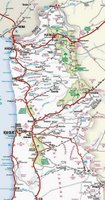 But Chile and Bolivia are not rivals, but sister nations, both squeezed and maneuvered by the interests of the U.S. and wealthy European governments. But Bolivia’s economic situation is much worse than Chile’s, which pushes them to immigrate to Chile or the U.S.
But Chile and Bolivia are not rivals, but sister nations, both squeezed and maneuvered by the interests of the U.S. and wealthy European governments. But Bolivia’s economic situation is much worse than Chile’s, which pushes them to immigrate to Chile or the U.S.
I always thought an outlet should be given, as does the entire Bolivian nation. Although I am of Chilean decent, I place first the interest of Latin America as a whole rather than the interest of wealthy Chileans. This question has brought down presidents in Bolivia and caused major disputes across the border, including shooting and injuring a Chilean truck driver. Chile bought gas from Bolivia until major demonstrations broke out, and then had to buy it via-Argentina. Now the Bolivian government is going to cut Argentina’s supply of gas to only meet their needs, as a protest against Chile in not giving them an outlet to the sea. But Chile economically does not feel pressure and will divert to other resources for their energy needs.
At this point, the Chilean government and capitalist class who’s interest are connected to the ports and natural resources in the north are not going to compromise with Bolivia unless two possibilities: 1) a war for control in which Chile is militarily superior; 2) a deal is made in which Chile feels they will make a profit.
What economic proposal can be made: a free trade zone in northern Chile that will give Bolivia space for their ships. It will also open trade between the three neighboring countries of Peru-Bolivia-Chile. It will allow Chile to continue to buy gas from Bolivia and Bolivia to transport their resources free of taxes. Also the construction of a new port for Bolivia in the city of Arica will open construction jobs for Chileans, and the Bolivians will have the opportunity of a new profession as seamen. But before the government’s can go a head with an agreement, open community forums for Bolivians and Chileans in the north to discuss the proposals and then a vote. This is the only way to assure that the long time hostilities are discussed and thought out to avoid any acts of violence.
Any ideas or comments would be helpful. Unless questions like these are resolved, the dream of a united Latin America will never become a reality. The trade agreement of ALBA (proposed by Cuba and Venezuela with Bolivia joining in) is an attempt towards unification, but other agreements, especially old border disputes that exists across the continent needs to be settled as well.
Hacer realidad el sueño de Bolívar, una America Latina unida!
 "We’re still standing tall. We outclassed them and we can go home with our heads held high."
"We’re still standing tall. We outclassed them and we can go home with our heads held high."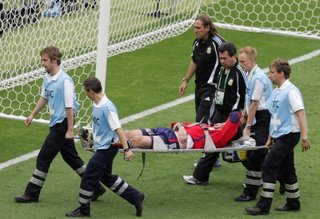 What is even sadder that Argentina's golie was taken-out by KLOSE of Germany when they collided and seriously injured Argentina's starting goal keeper. That could of been the difference, but it is now over. What was a relief that the Slovakian referee, Michel Lubos, has been one of the best in the tournament and the game was not smeered with controversy like many others. One thing that did stain Germany was their no.22, ODONKUR. He came in as a supplement and did nothing but play dirty including elbowing Argentina's no.11, Carlitos TEVEZ, in the head and when Tevez complained Odonkur pushed him and screamed at him inches from his face. Tevez showed what level he was one, and walked away (and also out played him).
What is even sadder that Argentina's golie was taken-out by KLOSE of Germany when they collided and seriously injured Argentina's starting goal keeper. That could of been the difference, but it is now over. What was a relief that the Slovakian referee, Michel Lubos, has been one of the best in the tournament and the game was not smeered with controversy like many others. One thing that did stain Germany was their no.22, ODONKUR. He came in as a supplement and did nothing but play dirty including elbowing Argentina's no.11, Carlitos TEVEZ, in the head and when Tevez complained Odonkur pushed him and screamed at him inches from his face. Tevez showed what level he was one, and walked away (and also out played him).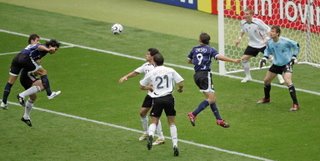 Roberto AYALA (No. 2, ARG)
Roberto AYALA (No. 2, ARG)












